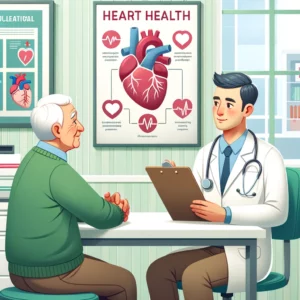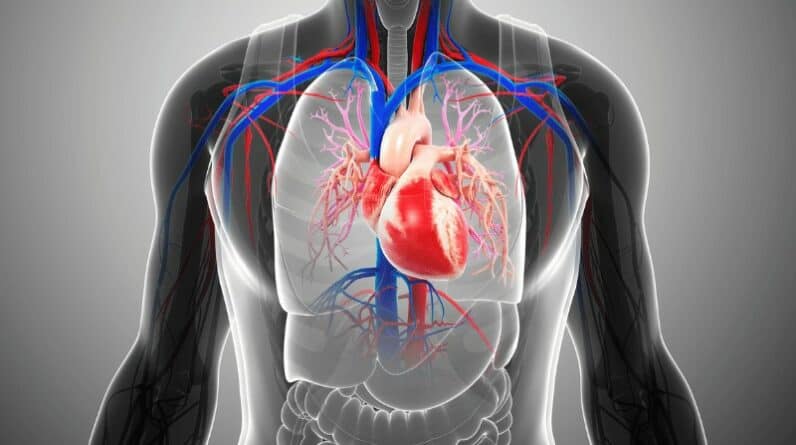Understanding Heart Health in Seniors
The connection between aging and heart health


Dementia Discovery That is Leaving Doctors Speechless (Try This Tonight)
Better than Morphine For Joint Pain… Yet Safer Than Aspirin?
Retire With Freedom. Start Earning Extra Cash Today.
Aging and heart health are intricately linked, with time bringing significant changes to cardiovascular function.
As individuals age, their heart muscles gradually weaken, and the arteries may become less flexible, increasing the risk of heart-related conditions such as hypertension, arrhythmia, and heart disease.
This natural aging process of the heart is often exacerbated by lifestyle choices made over the years, such as diet, exercise, and smoking habits.
Additionally, the age-related increase in oxidative stress and inflammation further contributes to the deterioration of heart health.
It’s crucial to understand that while aging is an inevitable process, its impact on heart health can be mitigated through proactive measures and lifestyle adjustments.
In the realm of preventive care, adopting a heart-healthy lifestyle becomes increasingly important with age.
This includes engaging in regular physical activity, maintaining a balanced diet rich in heart-healthy nutrients, and avoiding harmful habits like smoking and excessive alcohol consumption.
Monitoring blood pressure and cholesterol levels also plays a pivotal role in keeping the heart in good shape as one age.
By focusing on cardiovascular prevention, seniors can significantly improve their heart health and overall quality of life, even as they navigate the complexities of aging.
Common cardiovascular issues faced by seniors
Seniors often encounter a range of cardiovascular issues, which can significantly impact their health and quality of life.
One of the most common conditions is coronary artery disease (CAD), characterized by the narrowing or blockage of the coronary arteries due to plaque buildup. This can lead to chest pain, shortness of breath, and in severe cases, heart attacks.
Another frequent concern is hypertension, or high blood pressure, which poses serious risks for heart failure, stroke, and kidney disease.
As the body ages, the heart’s efficiency in pumping blood can decrease, and blood vessels may lose some of their elasticity, contributing to these conditions.
Additionally, arrhythmias, or irregular heartbeats, become more prevalent with age, potentially leading to complications like heart failure or stroke.
Managing these conditions often involves a combination of medication, lifestyle changes, and regular monitoring.
This includes regular consultations with healthcare providers, adherence to prescribed medication regimens, and lifestyle modifications such as adopting a heart-healthy diet, engaging in appropriate physical activity, and quitting smoking.
By focusing on comprehensive cardiac management, seniors can mitigate the effects of cardiovascular issues, maintaining their heart health and overall well-being in their later years.
Importance of diet in managing heart health
The role of diet in managing heart health cannot be overstated. What we consume has a direct and profound impact on our cardiovascular system.
A heart-healthy diet, rich in fruits, vegetables, whole grains, lean proteins, and healthy fats, can significantly reduce the risk of heart disease.
This type of diet aids in maintaining healthy blood pressure, reducing cholesterol levels, and keeping blood vessels in good condition.
Foods high in omega-3 fatty acids, such as salmon, and rich in antioxidants, like berries, are particularly beneficial for heart health.
On the other hand, foods high in saturated fats, trans fats, and cholesterol can contribute to the development of heart disease. Therefore, it is essential to limit the intake of red meat, full-fat dairy products, and processed foods.
Nutritional cardiology emphasizes the importance of dietary choices in managing heart health and preventing heart-related issues.
It supports the idea that through informed dietary choices, individuals can significantly influence their heart health.
This approach often involves a diet low in sodium, which helps control blood pressure, and rich in plant-based foods that provide essential nutrients without the adverse effects of high-fat and high-cholesterol food sources.
By focusing on nutritional cardiology, individuals can take proactive steps towards maintaining a healthy heart and reducing their risk of cardiovascular diseases.
The Fundamentals of a Heart-Healthy Diet for Seniors
Key nutrients that support cardiovascular health
Key nutrients play a pivotal role in supporting cardiovascular health, each contributing in unique ways to the overall functioning and well-being of the heart and blood vessels.
Omega-3 fatty acids, found in fish like salmon, mackerel, and sardines, are renowned for their heart-health benefits.
They help reduce triglycerides, lower blood pressure, and even decrease the risk of arrhythmias. Similarly, dietary fiber, especially soluble fiber found in foods like oats, legumes, and flaxseeds, is crucial for maintaining healthy cholesterol levels.
It assists in reducing the absorption of cholesterol in the bloodstream, thereby lowering the risk of heart disease.
Antioxidants, such as those found in berries, dark chocolate, and green vegetables, play a significant role in protecting the heart by reducing oxidative stress and inflammation, both of which are known contributors to cardiovascular disease.
Another key nutrient is potassium, which is vital for blood pressure regulation.
Foods rich in potassium, like bananas, spinach, and sweet potatoes, help balance the negative effects of salt and assist in proper muscle function, including the heart muscle.
By focusing on cardiac nutrition and adopting a heart-healthy diet, individuals can significantly influence their cardiovascular health, reducing the risk of heart disease and improving overall heart function.
Balancing calories and physical activity
Balancing calories and physical activity is a fundamental aspect of maintaining a healthy lifestyle and achieving optimal health outcomes.
The principle is simple yet powerful: the calories you consume through food and drink should be balanced with the calories you expend through physical activity.
This equilibrium is crucial for maintaining a healthy body weight, which is directly linked to overall health, including reduced risk of chronic diseases such as heart disease, diabetes, and certain types of cancer.
Regular physical activity not only burns calories but also strengthens muscles, improves cardiovascular health and enhances mental well-being.
It’s not just about the quantity of calories consumed, but also the quality. A diet rich in nutrients and low in processed foods and added sugars is essential for providing the body with the energy it needs to function effectively.
Understanding and managing this energy balance is key to achieving and maintaining a healthy weight.
It requires a holistic approach that includes a balanced diet and regular physical activity. For instance, incorporating a mix of aerobic exercises, strength training, and flexibility activities can optimize health benefits.
Additionally, being mindful of portion sizes and choosing nutrient-dense foods over calorie-dense options can help manage calorie intake more effectively.
By focusing on energy balance, individuals can take control of their health and work towards a more active, balanced, and healthy lifestyle.
Role of dietary fiber in heart health
Dietary fiber plays a crucial role in promoting heart health, offering multiple benefits that extend beyond the digestive system.
Soluble fiber, found in foods like oats, beans, apples, and carrots, is particularly beneficial for the heart. It helps lower levels of LDL cholesterol (often referred to as “bad” cholesterol) in the blood.
This type of cholesterol is a major risk factor for heart disease, as it contributes to the buildup of plaques in the arteries, potentially leading to atherosclerosis.
By binding with cholesterol in the digestive system, soluble fiber helps it to be excreted from the body, thereby reducing cholesterol levels.
Additionally, high-fiber diets are associated with lower blood pressure and reduced inflammation, both of which are crucial for maintaining a healthy heart.
Incorporating a wide range of high-fiber foods into one’s diet is a key aspect of cardiovascular nutrition.
Not only does fiber aid in cholesterol management, but it also helps in maintaining a healthy weight and stabilizing blood sugar levels, which are important factors in heart disease prevention.
Moreover, a diet high in fiber typically means an increased intake of vitamins, minerals, and antioxidants, all of which contribute to overall cardiovascular health.
Thus, understanding and utilizing the benefits of dietary fiber is an essential part of a heart-healthy lifestyle.
Foods to Embrace: Heart-Healthy Grocery List
Fruits and vegetables: varieties and benefits

Fruits and vegetables, in their vast array of colors, shapes, and flavors, are an integral part of a nutritious diet, offering a multitude of health benefits.
The variety is not just for aesthetic appeal or taste; each color and type of fruit or vegetable signifies a different blend of essential nutrients, vitamins, minerals, and antioxidants.
For instance, leafy greens like spinach and kale are rich in vitamins A, C, and K, as well as iron and calcium, while bright orange and yellow vegetables like carrots and sweet potatoes are high in beta-carotene, which is essential for eye health.
Berries, known for their vibrant colors, are packed with antioxidants that aid in preventing cell damage and reducing inflammation.
On the other hand, citrus fruits like oranges and lemons are excellent sources of vitamin C and folate.
.This approach to eating focuses on consuming a variety of plant-based foods to obtain a comprehensive range of nutrients necessary for optimal health.
Incorporating a diverse range of fruits and vegetables into your diet not only enhances your nutrient intake but also supports heart health, reduces the risk of chronic diseases, and helps in weight management.
Furthermore, the high fiber content in fruits and vegetables aids in digestion and maintains a healthy gut microbiome.
With such an array of health benefits, fruits and vegetables are fundamental components of plant-based nutrition and overall well-being.
Whole grains for sustained energy
Whole grains are a vital component of a balanced diet, providing sustained energy and numerous health benefits.
Unlike refined grains, whole grains include all parts of the grain – the bran, germ, and endosperm. This composition not only provides a rich source of dietary fiber but also ensures a steady supply of energy.
The complex carbohydrates in whole grains are broken down more slowly in the body compared to refined grains, leading to a gradual release of glucose into the bloodstream.
This slow and steady digestion helps maintain consistent energy levels throughout the day and prevents spikes in blood sugar levels, which are often followed by crashes in energy.
In addition to energy, whole grains are packed with essential nutrients like B vitamins, iron, magnesium, selenium, and phytochemicals that contribute to overall health.
Whole grains like oats, quinoa, brown rice, and whole wheat not only provide the energy needed for daily activities but also play a significant role in long-term health.
They have been linked to a lower risk of chronic diseases such as type 2 diabetes, heart disease, and certain types of cancer.
The dietary fiber in whole grains also aids in digestive health and can assist in weight management by providing a sense of fullness and reducing the likelihood of overeating.
Incorporating a variety of whole grains into one’s diet is a smart way to ensure a stable and sustained source of energy while also reaping numerous other health benefits.
Lean proteins and plant-based alternatives
Lean proteins and plant-based alternatives are key elements in a heart-healthy diet for seniors, offering essential nutrients without the high levels of saturated fats found in many animal-based proteins.
Lean proteins, such as skinless poultry, fish, and lean cuts of meat, provide the necessary amino acids for muscle maintenance and repair, which is crucial for aging individuals.
Fish, especially fatty varieties like salmon and mackerel, are also rich in omega-3 fatty acids, which are known for their heart-protective properties.
These types of proteins support cardiovascular health by helping to lower blood cholesterol levels and reduce the risk of heart disease.
Plant-based protein alternatives, such as legumes, tofu, and quinoa, are also integral to a heart-healthy diet, particularly for seniors looking to reduce their intake of animal fats.
These protein sources are not only low in fat but also high in fiber and other heart-healthy nutrients.
Incorporating a mix of both lean animal proteins and plant-based alternatives into the diet can provide seniors with a balanced intake of essential nutrients while also catering to heart health.
Such dietary choices are key in managing weight, reducing the risk of high cholesterol, and maintaining overall well-being in the later years of life.
Healthy fats: identifying and including them in your diet
Healthy fats play a crucial role in a heart-healthy diet, especially for seniors, as they contribute to overall cardiovascular wellness and provide essential nutrients.
Identifying and including these fats in one’s diet is key to maintaining heart health. Unsaturated fats, which include monounsaturated and polyunsaturated fats, are considered beneficial for the heart.
These can be found in sources like olive oil, avocados, nuts, and seeds, as well as in fatty fish such as salmon and mackerel, which are rich in omega-3 fatty acids.
These fats help to reduce bad cholesterol levels (LDL) and increase good cholesterol levels (HDL), thereby reducing the risk of heart disease and stroke.
Additionally, they aid in the absorption of certain vitamins and provide essential fatty acids that the body cannot produce on its own.
It’s not just about reducing fat intake but choosing fats wisely. Replacing saturated fats and trans fats, typically found in processed foods, with healthier unsaturated fats can have a significant impact on cardiovascular health.
For seniors, this means not only paying attention to the types of fats consumed but also to the overall balance of their diet, ensuring it’s rich in various nutrients needed to support heart health and general well-being.
By incorporating healthy fats into a balanced diet, seniors can enjoy flavorful meals while taking care of their heart health.
Foods to Avoid: Steering Clear of Heart Hazards
The impact of high sodium on blood pressure
The impact of high sodium intake on blood pressure is a critical concern, particularly in the context of a heart-healthy diet for seniors.
Sodium, commonly consumed as salt, plays a significant role in regulating blood pressure. However, excessive sodium intake can lead to increased blood pressure, a condition known as hypertension, which is a major risk factor for heart disease and stroke.
As the body ages, its ability to process sodium efficiently diminishes, making seniors particularly susceptible to the effects of high sodium levels.
This heightened sensitivity means that even moderate amounts of sodium can significantly raise blood pressure in older adults, underscoring the importance of monitoring and controlling sodium intake.
For seniors, adopting a low-sodium diet often involves limiting processed and canned foods, which are typically high in added salt, and emphasizing fresh, whole foods.
Additionally, using herbs and spices as alternatives to salt can enhance the flavor of food without increasing sodium content.
By being mindful of sodium intake and opting for low-sodium choices, seniors can effectively manage their blood pressure, significantly reducing the risk of developing heart-related complications and thereby improving their overall cardiovascular health.
Negative effects of trans and saturated fats
Trans and saturated fats are known to have negative effects on health, particularly concerning heart disease and cholesterol levels.
Trans fats, often found in processed foods like baked goods, snack foods, and fried items, are particularly harmful.
They not only increase levels of LDL (low-density lipoprotein), commonly known as “bad” cholesterol, but also decrease levels of HDL (high-density lipoprotein), or “good” cholesterol.
This double jeopardy significantly elevates the risk of developing heart disease and stroke.
Additionally, trans fats have been associated with increased inflammation and insulin resistance, further exacerbating health risks, especially for those with conditions like obesity and diabetes.
Saturated fats, commonly found in red meat, full-fat dairy products, and certain oils, also contribute to the rise in LDL cholesterol, thereby increasing the risk of heart disease.
While they do not affect HDL cholesterol like trans fats, their overall impact on heart health is concerning.
Replacing trans and saturated fats with healthier alternatives, such as monounsaturated and polyunsaturated fats found in olive oil, nuts, and fish, can help in maintaining a healthier cholesterol profile.
This dietary shift is crucial in preventing the buildup of plaques in the arteries, reducing the risk of heart attacks and strokes, and promoting overall cardiovascular health.
Understanding the risks of excessive sugar intake
Excessive sugar intake poses significant health risks, impacting not only weight management but also increasing the likelihood of developing chronic conditions such as type 2 diabetes, heart disease, and certain cancers.
When consumed in large amounts, sugar can lead to obesity, a major risk factor for numerous health issues.
High sugar consumption affects the body’s insulin sensitivity, potentially leading to insulin resistance, a precursor to diabetes.
Additionally, excess sugar can cause inflammation, oxidative stress, and an increase in triglyceride levels, all of which are detrimental to cardiovascular health.
These effects are compounded by the fact that sugary foods often lack essential nutrients, leading to an overall poor-quality diet.
Understanding these nutritional risk factors is essential for making informed dietary choices.
Reducing sugar intake, particularly from processed and refined sources, can have a significant positive impact on overall health.
Instead, focusing on a balanced diet rich in fruits, vegetables, whole grains, and lean proteins can help mitigate the risks associated with high sugar consumption.
By recognizing the risks of excessive sugar intake and adjusting eating habits accordingly, individuals can take proactive steps towards maintaining a healthier lifestyle and reducing the likelihood of developing chronic diseases.
Practical Tips for Heart-Healthy Meal Planning
Portion control and its significance

Portion control is a vital aspect of maintaining a healthy diet and lifestyle, and its significance cannot be overstated.
It involves understanding and regulating the amount of food consumed at each meal, which is crucial for preventing overeating and managing calorie intake.
Proper portion control helps in maintaining a balanced diet, ensuring that one consumes the right amount of nutrients without excess calories that can lead to weight gain and associated health issues like obesity, heart disease, and diabetes.
It’s not just about eating less; it’s about eating the right amounts of different types of food.
For instance, filling half your plate with vegetables, a quarter with lean protein, and the remaining quarter with whole grains is a practical approach to portion control that also ensures a balanced nutrient intake.
Portion control is especially important in today’s environment, where food servings, particularly in restaurants and pre-packaged meals, are often much larger than what is needed for an average meal.
By becoming more mindful of portion sizes and learning to listen to the body’s hunger and fullness cues, individuals can significantly improve their eating habits.
This approach to dietary management is a key factor in preventing overeating, reducing the risk of chronic diseases, and promoting long-term health and wellness.
Smart substitutions in classic recipes
Smart substitutions in classic recipes are an ingenious way to enjoy your favorite dishes while making them healthier and more nutritious.
This approach to cooking involves replacing certain ingredients that are high in calories, fats, sugars, or sodium with healthier alternatives, without compromising on taste or texture.
For instance, in baking, unsweetened applesauce or ripe mashed bananas can be used as a substitute for butter or oil, significantly reducing the fat content while adding natural sweetness and moisture.
Similarly, using whole-grain flour instead of white flour not only enhances the fiber content but also adds a new dimension of flavor.
In savory dishes, replacing cream with Greek yogurt maintains the creamy texture but with a fraction of the fat and calories, and increases protein content.
These smart substitutions are not just about reducing unhealthy components; they also focus on increasing the nutritional value of the dish.
Swapping out white rice with quinoa or brown rice, for example, adds protein and fiber, making the meal more filling and nutritionally balanced.
Herbs and spices can be used in place of salt to add flavor without increasing sodium intake.
Such substitutions are particularly helpful for those managing health conditions like diabetes, high blood pressure, or high cholesterol, as well as for anyone looking to maintain a healthier lifestyle.
Experimenting with different ingredients and flavors not only makes cooking more enjoyable but also allows for the creation of dishes that are both delicious and beneficial for overall health.
Importance of hydration and appropriate beverage choices
Hydration plays a crucial role in maintaining overall health and well-being, making it essential to understand the importance of hydration and make appropriate beverage choices.
Water, the most fundamental component of our body, is involved in numerous vital functions, including regulating body temperature, transporting nutrients and oxygen to cells, and flushing toxins from the body.
Adequate hydration aids in digestion keeps the skin healthy, and can even improve cognitive function and mood.
When the body is not sufficiently hydrated, it can lead to dehydration, causing symptoms such as fatigue, headaches, and in severe cases, more serious health complications.
It’s especially important for physically active individuals, as well as for those in hot climates, to regularly replenish the fluids lost through sweat.
When considering beverage choices, it’s important to be mindful of the types of drinks consumed.
Water is the best choice for staying hydrated without added calories, sugars, or artificial ingredients.
However, other beverages like herbal teas and infused waters can also contribute to hydration while offering a variety of flavors.
It’s advisable to limit the intake of sugary drinks, such as sodas and fruit juices, as they can contribute to weight gain and other health issues when consumed in excess.
Similarly, caffeine and alcohol can have diuretic effects, potentially leading to dehydration if not balanced with adequate water intake.
Understanding the impact of different beverages on hydration and overall health is key to making informed choices that support a healthy lifestyle.
Staying Heart-Healthy: Lifestyle and Dietary Commitments
Integrating physical activities into daily routines
Integrating physical activities into daily routines is a practical and effective strategy for maintaining health and wellness.
In today’s fast-paced lifestyle, finding time for structured exercise can be challenging, but incorporating physical activity into everyday tasks can significantly contribute to achieving fitness goals and enhancing overall health.
Simple changes, such as taking the stairs instead of the elevator, walking or biking for short errands, or even standing while talking on the phone, can increase daily activity levels.
These small steps add up, boosting cardiovascular health, strengthening muscles, and improving flexibility and balance.
Furthermore, integrating physical activity into daily routines encourages a more active lifestyle and can be a sustainable approach to staying fit, as it doesn’t require setting aside additional time for exercise.
Additionally, turning household chores into workout opportunities is another way to incorporate physical activities into daily life.
Gardening, for example, involves bending, lifting, and stretching, which are great for muscle strength and endurance.
Similarly, vigorous cleaning tasks like vacuuming or mopping can be a good cardiovascular workout.
For those spending long hours at a desk, setting reminders to stand and stretch every hour, or using a standing desk, can help reduce the risks associated with prolonged sitting.
These integrated activities not only contribute to physical health but also mental well-being, as regular physical movement is known to reduce stress and improve mood.
By creatively weaving physical activity into everyday routines, individuals can effortlessly maintain a more active and healthier lifestyle.
The value of regular health screenings
Regular health screenings are invaluable in maintaining good health and early detection of potential health issues.
These screenings are critical because many serious health conditions, such as high blood pressure, diabetes, and certain cancers, can develop silently, presenting little to no symptoms until they have progressed significantly.
Regular check-ups and screenings provide an opportunity for early intervention, which can greatly improve the chances of successful treatment and management.
For instance, early detection of conditions like breast cancer or prostate cancer through routine screenings can lead to treatments that are more effective, potentially saving lives.
Moreover, regular health screenings can also help individuals keep track of their health status, monitor any changes, and make informed decisions about their lifestyle and health care.
Health screenings are also tailored based on age, gender, and risk factors, ensuring that individuals receive the most appropriate and beneficial tests.
For example, women are recommended to have regular mammograms for breast cancer screening, while men may be advised to have prostate exams.
Older adults might have screenings for conditions like osteoporosis or colon cancer.
These screenings not only help in the early detection of diseases but also provide a platform for healthcare providers to offer advice on maintaining a healthy lifestyle and managing risk factors.
In essence, regular health screenings are a proactive approach to health care, allowing individuals to take control of their health and well-being.
By identifying potential health issues early, making lifestyle adjustments, or beginning treatments sooner rather than later, the impact of many health conditions can be significantly reduced.
Building a support system for a heart-healthy lifestyle
Building a support system is a vital component of maintaining a heart-healthy lifestyle. A strong network of family, friends, healthcare professionals, and even community groups can provide the encouragement, motivation, and accountability needed to stick to heart-healthy habits.
This support can come in various forms, such as a family member helping to prepare heart-healthy meals, a friend joining in for regular walks or exercise sessions, or a support group where experiences and challenges can be shared with others on a similar journey.
Such social support has been shown to improve adherence to lifestyle changes, making it easier to maintain a healthy diet, engage in regular physical activity, and manage stress – all crucial factors in heart health.
Additionally, a support system can offer emotional and psychological support, which is essential for overcoming setbacks and staying motivated.
Heart health can be influenced significantly by mental well-being, and having a supportive network to turn to during challenging times can make a huge difference.
Healthcare professionals play a key role in this system, offering expert advice, monitoring progress, and adjusting strategies as needed.
They can also provide resources and education about heart health, helping individuals to make informed decisions about their lifestyle.
Building and nurturing a support system creates a positive environment that encourages heart-healthy living, making it a key strategy for anyone looking to improve or maintain their cardiovascular health.
Heart Healthy Diet For Seniors-Conclusion

In conclusion, the diverse topics covered highlight the multifaceted approach necessary for maintaining overall health and well-being, particularly with a focus on heart health.
From understanding the detrimental effects of high sodium intake and unhealthy fats to recognizing the importance of hydration, portion control, and smart dietary substitutions, each topic underscores the significance of a balanced and mindful approach to nutrition.
Equally important is the incorporation of physical activity into daily routines, which complements dietary efforts and contributes to cardiovascular strength and general health.
These lifestyle choices are further enhanced by the value of regular health screenings, emphasizing the importance of proactive healthcare management and early detection of potential health issues.
Additionally, the role of a support system in maintaining a heart-healthy lifestyle cannot be overstated. It provides the emotional and practical backing necessary to make and sustain these lifestyle changes.
Collectively, these topics paint a comprehensive picture of the various aspects of health management.
They demonstrate that taking care of one’s health is not just about focusing on one aspect, but rather it involves a holistic approach that combines diet, exercise, regular health checks, and social support.
By integrating these elements, individuals can create a robust foundation for a healthier, more fulfilling life, with a strong heart at its core.
Disclaimer: The information in this article is intended for educational and entertainment purposes only and should not be used instead of or contrary to that of a medical professional.
Before taking supplements, starting a new diet, or embarking on a new exercise regime please consult a medical or nutritional professional.
The owners of “Getting Healthy After 50” are not medical professionals and are simply redistributing information that is freely available on the internet.






